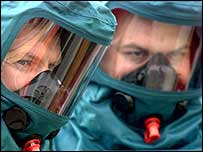
Security alerts are now a fact of life
|
Planned new powers for dealing with a major terrorist attack and other big emergencies are unveiled on Wednesday.
Ministers have already published drafts of the new laws, which were criticised by an influential committee of MPs and peers for putting human rights at risk.
They fear that unless the Civil Contingencies Bill contains suitable constraints its powers could be abused by a future government.
Civil rights campaigners want the new powers to be more strictly defined.
The government published its draft legislation last June to give MPs and peers the chance to examine legislation before it is debated in Parliament.
The Queen's Speech included a promise to put the plans into law.
But a parliamentary committee set up to look at the plans said they had "potentially dangerous flaws".
Police powers
The measures are aimed at shaking up legislation that dates back to the 1920s, giving ministers all the powers they need to tackle a wide range of incidents - ranging from foot-and-mouth to an attack on the internet.
 |
SUMMARY OF KEY POWERS IN DRAFT BILL:
Ministers will be able to bypass Parliament to make emergency regulations
Police will be able to ban public gatherings, impose curfews, seize property
The Human Rights Act could be suspended
|
The draft plans included enabling the government to rush through temporary legislation without prior Parliamentary approval, with authorities having new powers to declare a regional state of emergency.
The police would get new powers to evacuate danger areas in the event of a "catastrophic incident".
They could also be able to restrict public access to "sensitive sites" if there was a serious terror threat.
The definition of an emergency would also be extended to encompass emergency situations affecting national security, human welfare, the environment and "political, administrative or economic stability".
Democracy fears
Committee chairman Lewis Moonie said his main concern was over human liberty and rights because the terms used in the bill were "too vague".
 |
 We should not put such power into the hands of anybody without suitable constraints
We should not put such power into the hands of anybody without suitable constraints

|
"The basis under which the government could take these powers to itself - the way in which government defines an emergency - I think is the first concern," he told BBC Radio 4's Today programme.
"If they listen to us, as I'm pretty sure they will, they should have changed the terms on which this is done and made it much more explicit how they take these powers in the first place."
Dr Moonie, a former defence minister, said: "Nobody is considering that this government or the former Conservative government would have abused these powers.
"But who could say that a future government might not? We should not put such power into the hands of anybody without suitable constraints."
'Loose definitions'
Civil rights campaigners say the plans give ministers too much scope to define an emergency.
Pressure group Liberty said the definition of an emergency was "extraordinarily wide", was open to potential abuse by unscrupulous governments and did not safeguard human rights challenges.

Terror fears have put the spotlight on emergency planning
|
As currently framed, the new powers could be used against political protests, computer hacking or a campaign against banking practices, it says.
Shami Chakrabarti, Liberty's director, told BBC Breakfast: "We're looking for a much more focused definition of what is a public emergency.
"We're looking for earlier and greater parliamentary scrutiny in those situations and not just law by governmental edict.
"Crucially we're looking for proper scrutiny by the courts which wasn't allowed for in the existing draft in relation to human rights questions that will arise in a public emergency."
Determined
But in response to the concerns, the government has tightened its definition of an "emergency" to make clear its new powers cannot be activated by an event which merely threatens the "political, administrative or economic stability" of the country.
The bill, which is to be presented to Parliament by Cabinet Office Minister Douglas Alexander will now state that an emergency is an event or situation which "threatens serious damage to human welfare, the environment or the security or the UK or part of it".
Home Office Minister Hazel Blears told BBC Breakfast the government hoped to strike the right balance between civil rights and giving the police sufficient powers to protect the public.
"We are hoping very much the bill will get that balance right and when a disaster happens we want to make sure that the police have got the right powers and are able to protect the public," she said.
"We are absolutely determined that we will try and strike the right balance between civil liberties and also the very important rights to protect the community."

